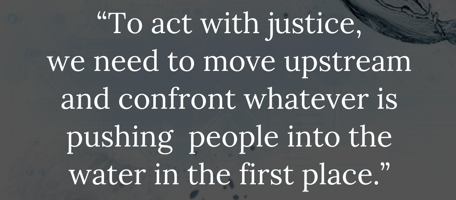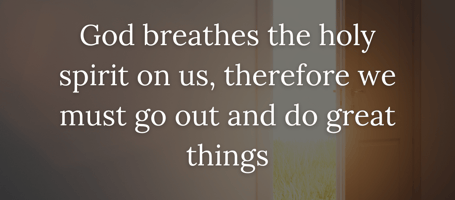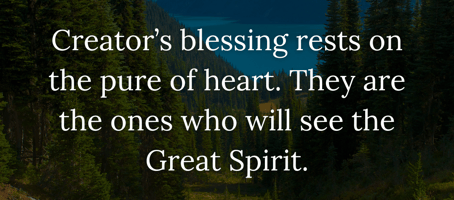During Plymouth Church’s Just Peace Sunday worship services, we pray for worldwide peace and...
Beyond Peacekeeping: Jesus Calls Us To Be Peacemakers

I recently had an experience that caused me to reflect on my dedication to my prayer life.
About three times a week, I drive down Lake Drive. Every day, as I pass underneath a bridge, I notice these protestors. They’re on the bridge with their signs and waving at the passing cards, calling for an end to the Israeli-Gaza conflict. Sometimes the group dwindles down to just a handful of people, but that doesn’t stop them from showing up and spreading their message.
As I passed under the bridge last week, I thought about their dedication to their call for justice.
I thought about how sometimes I am quick to give up on my prayer life. Sometimes I say a quick prayer and then think, “God will just work it out.” Sometimes it feels like I am not willing to put in the actual work.
At times, calling for justice or even dealing with our own personal problems can feel daunting. But as we hear in Psalm 46, “God is our refuge and strength, a very present help in trouble.” In the midst of all of our problems, God calls us to rest and have peace. In Matthew 5:10-12, Jesus says “Blessed are the peacemakers, for they will be called children of God.” What does it mean to have peace as a peacemaker?
We can learn what it means to be a peacemaker by reading Matthew 10:34-36. Jesus says, “Do not think that I have come to bring peace to the earth; I have not come to bring peace, but a sword.” We see that in Matthew 21:12, Jesus enters the temple courts and overturns the tables of the money changers and the benches of those selling doves. In order to make peace, there had to be conflict.
Sometimes we are more like peacekeepers than peacemakers. There are times when we ignore our conscience when we know something isn’t right. We see an example of this in the Easter Story. Pontius Pilate gave in to the protestors and released Barabbas instead of Jesus Christ in order to appease the protestors. He knew that Jesus Christ was innocent, but he chose to keep the peace rather than make peace.
There is a difference between a peacekeeper and a peacemaker. A peacekeeper is someone who tries to avoid conflict. A peacemaker actively pursues peace at all costs.
But what does it mean when we say “blessed are the peacemakers?”
It has to do with our heart. Matthew 5:8 reads, “Blessed are the pure in heart, for they will see God.” The blessed will not have their hearts contaminated – they will not behave one way when people are watching and then another way when those same people aren’t looking. We see a contradiction between the Pharisees and Jesus Christ.The Pharisees were concerned with outward appearance and ceremonial dogma. Jesus Christ was concerned only with the heart.
Peacemaking is messy. It's hard work. Malala Yousafzai, who spoke out against the Taliban in defense of human rights, is a peacemaker. Muahmmad Ali, who refused to fight in the Vietnam War and nearly went to prison for his protest, was a peacemaker. Ghandi and Martin Luther King Jr., who were both killed because of their convictions going up against an unjust system, were peacemakers.
What are the qualities of a peacemaker?
A peacemaker promotes and embraces harmony.
A peacemaker actively forgives and embodies the values of forgiveness.
A peacemaker is humble and puts the needs and concerns of others first.
A peacemaker is one who advocates for justice.
A peacemaker is someone who uses love as a motivation to contribute to peace.
A peacemaker is patient.
Peacemakers are people of reconciliation. The goal of peacemakers is to restore broken relationships and to facilitate healing in individuals and communities.
Let us remember these qualities as we work towards making peace not only in our congregation’s mission work, but also in our personal lives and our prayer lives.





